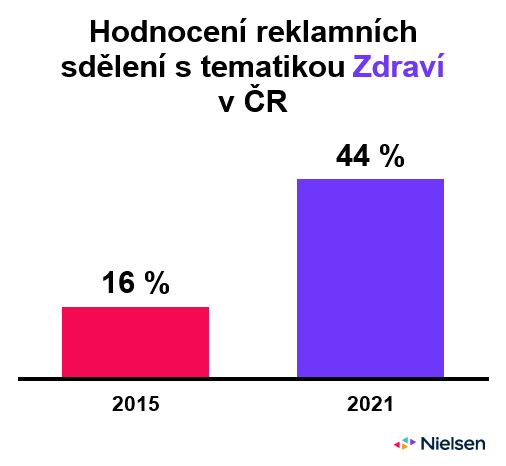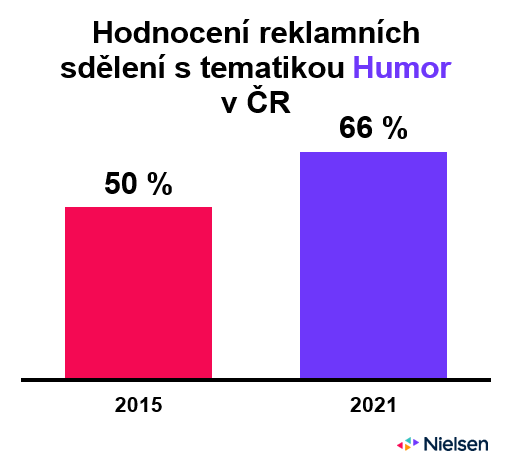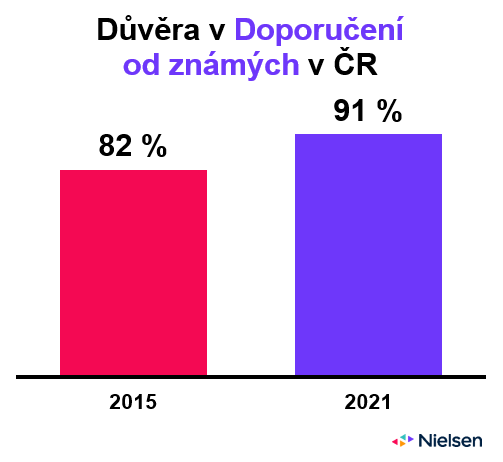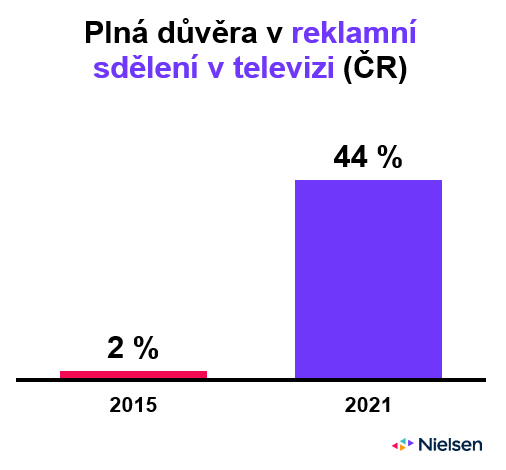We are at the beginning of the third year of restrictions due to the coronavirus pandemic. Over the past two years, the mood of society has changed in response to the current restrictions and new anti-epidemic measures, and this instability has, among other things, made it difficult for marketers to understand the behaviour of their target audiences. Information on how consumers consume media content, how and where they buy and which communication channels they trust most is crucial for marketers.
In particular, the latest international Trust in Advertising study, conducted by the research company Nielsen in autumn 2021, which examines consumer trust in advertising messages and other communication channels, helps marketers with the last question. It was conducted in 56 countries and involved a total of 40,000 respondents. This is the third edition of the study, having previously been conducted in 2013 and 2015. In each of its sections, it offers data in smaller detail for the entire region or in larger detail for individual countries, all in a web-based interface. In the Czech Republic, the study is available through Nielsen's Czech office - Nielsen Admosphere.
When compared with previous years, the impact of the current situation on consumers' perception of advertising messages is quite evident in some of the responses. For example, it is clear from the responses of respondents in North America that there has been an increase in interest in health and family. In 2015, less than a quarter of respondents had a positive perception of Health in advertising messages, while by 2021 this figure had risen to more than half. A similar trend can be observed for the Family theme. In 2015, these messages were perceived positively by about a third of respondents, while in 2021 it was already about half.
This trend can also be observed in the Czech Republic in the same categories. The most noticeable increase is in the Health topic. While in 2015 only 16% of respondents showed a positive response, in 2021 this was already the case for 40% of them. However, advertising messages with Humour theme resonate the most among the Czech population. Two thirds of respondents have a positive opinion of these.
 Evaluation of advertising messages with the theme of Health in the Czech Republic; Source: Nielsen, Trust in Advertising 2021
Evaluation of advertising messages with the theme of Health in the Czech Republic; Source: Nielsen, Trust in Advertising 2021 Evaluation of advertising messages with the theme of Humour in the Czech Republic; Source: Nielsen, Trust in Advertising 2021
Evaluation of advertising messages with the theme of Humour in the Czech Republic; Source: Nielsen, Trust in Advertising 2021Looking at the Czech data on trust in individual advertising communication channels, it probably comes as no surprise that most respondents trust recommendations from their friends: 91% of respondents identified them as a trusted "communication channel”.
 Trust in recommendations from friends in the Czech Republic; Source: Nielsen, Trust in Advertising 2021
Trust in recommendations from friends in the Czech Republic; Source: Nielsen, Trust in Advertising 2021On the other side of the rankings, influencer marketing was ranked. Only 4% of respondents marked it as completely trustworthy, while 45% marked it as somewhat trustworthy. This suggests that this type of marketing has potential in our country, but for now consumers are slightly sceptical.
Among the traditional media types in the Czech Republic, thematic advertising in magazines and outdoor advertising scored high. Traditional television advertising also enjoys a decent level of trust. A total of 44% of respondents said they trusted it completely. This is a significant increase compared to 2015: a large proportion of respondents who trusted TV advertising rather trusted it completely in 2021. More than half of respondents also trust online customer reviews completely.
 Full trust in television advertising in the Czech Republic; Source: Nielsen, Trust in Advertising 2021
Full trust in television advertising in the Czech Republic; Source: Nielsen, Trust in Advertising 2021So the typical Czech consumer still relies most heavily on the opinions of people close to them (either friends or customers buying similar goods, see high trust in online consumer reviews) - and no advertising messages have yet matched these in terms of trust. However, we are not unique in this; other regions are showing a similar trend. However, a multinational study by Nielsen also shows that classic TV advertising, which has established itself as a trusted communication channel in our country, holds strong potential.
Martin Chalupník, Nielsen Admosphere
Source: mediaguru.cz

